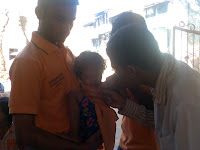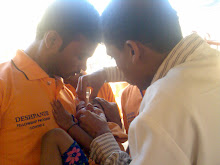Mr. Venugopal former Director of Swami Vivekanda Youth Movement Mysore; his session was very joy full and creative because this session was not only one way that was two ways method happened, in this class I learned so many approaching and social service methods. And today what we are facing social problems in rural or urban areas and how can we solve this problems and which type of methods we can use in field with how we successful entrepreneur happened and he made some groups in participants and gave the some presently what we are facing issues for each groups, and he told solve this problems. And each groups presented different of opinions he collected all suggestions and gave perfect suggestions. His told about how can we social entrepreneur and what is our role in society. Overall we learned more things.
Date: 02/02/09
Topic: Public Health
Faculty: Mrs.Meenakshi, Global Sandbox Fellowship Programme Officer,USA
Started with the introduction of the group members, by sharing Name, background and the activity done during the week end. It was a good activity at the beginning of the day’s process to learn about Public Health. The faculty person started the session with introduction and definition to Public Health. After providing a brief idea about PH, a small tele film was screened on Indore. The tele film consisted of the approaches that were used to provide Public Health in the area of slums which are in and around Indore.
Followed by this, the fellows were asked to answer the questions based on the approaches that were used in the area of Indore. The questions were also focused on bringing out the innovativeness in the fellow members. Duration of 30 mins was given to answer the questions given and the answer sheets were collected back for correction.
Followed by the refreshments break, the focus on module continued to go depth in understanding the context of Public health. The strategy that was used by the speaker was so good that it kept all the fellows intact with the on goings through the two way discussions. The fellows were so much encouraged that everyone showed the interest of sharing their views and ideas without any hesitation. Mr. Golden Frankly’s presence gained the group by his personal sharing.
Later, the group was divided into 4 sub groups and a similar case was given to two groups on which the groups were asked to debate with one group ‘for’ and ‘against’ related to the case they were given. It was a great experience to many of the group members as the debate was healthy with pre-guidelings and facilitation by Mrs.Meenakshi and gave a break for lunch. The two topics were one that emphasized on opinion about Public Smoking and the other on Sex Education for school children.
After breaking for lunch break, later the group of two members was made and were given 2 scenario of the NGOs on which the fellows were asked to discuss the problems existed in the case and also it led path to think innovative idea on addressing the problems that were presented in the case given. All the fellows took part in expressing the ideas that they had towards the problem.
The next activity was done forming sub groups consisting of 3 members in each group and asked to write a project proposal to the funders (Ajay, Malini and Chandrashekar) to get grants for the activity what were the fellows would like to start up with. It was rather a good session to learn the criteria to receive funds from a funding organization. It helped understanding the approach required in receiving grants for the social development activities. This concluded the day’s activity.
As per my observation, I would like to share that all the group members showed high participation in the group activities and sharing their valuable ideas during the session. The credit goes to Ms. Meenakshi that she adopted the method of teaching where all could open up with their views towards the topic. The session was concluded at 5:45pm.
3rd feb, 2009
Topic: P R A
Faculty: Dr.Prakash.Bhatt, BAIF, Karnrataka.
Morning session started by doing recap session of day before yesterdays class by Ajay and Lakshmmish
Mr. Chinnababu explained about Evaluation procedure for Faculties, discussed about Toast master session should be done regularly to improve our communication skills, by practicing different type of speech like storytelling, motivational speech etc.
After that few Reading groups presented the seminar about PRA, after that chinnababu gave information regarding village stay and what kind of Dress code should be ware during village visit. Later selected few fellows to teach Microsoft skills (Word, power point, publisher) to newly joined fellows.
For Participatory rural Appraisal, Dr. Prakash Bhatt handling PRA topic as a faculty. He is working in BAIF Ngo’s, at present he is on lien. Dr.Bhatt started session by singing a prathrana Kannada song, after that he told all fellows to introduce other fellows who are sitting behind to them. it was a good experience for all fellows to know each other. Later Fellows were asked to form groups and told us to discuss within a group about the problems and cause of developing Indian Villages. Halfan hour was gave to discuss in groups, Before lunch break one group presented.
Remaining team presented after break, during presentation many fellows came out with interesting question like how can we participate people in development etc…All group presented well, by this activity we came to know about basic problems enhancing in villages but not with solution. really we have to think on those problem.
Overall purpose of this exercise is to understand where we stand in knowledge wise and to know the cause & effect relation of problems. Many times Knowledge will restrict us. Knowledge is a bias for all of us. It’s just like ‘ignorance is a thorn and we need a knowledge thorn to remove ignorance thorn’.
Shambu and Hanmanthu performed mimicry for refreshment before tea break. later explained about the paradigms, the way we see certain things
In development issues there are some paradigms, how we see the problems is entirely different from how beneficiary oversee the problem. if we want to develop villages means make people to know there problem rather than giving tempravory solution.
Explained about how attitude of the people changed constantly towards problem foreseeing from years later like, we have all the right answer if they have right problem
At last explained about why PRA and before PRA how we have to prepare and during PRA we have to adopt adult -adult relation not parents -child relation. Adult-adult relation means we have to treat them equally, first thing we have to trust each other and then try to find similarities between people not differences. Told to come and prepare by reading resource material.
Date: 4/2/2009
Topic: P R A
Faculty: Dr.Prakash.Bhatt, BAIF, Karnrataka.
The class started as usual at 9 0’ clock in the morning. Then Beerlinga joined them. Meanwhile Chinnababu entered the class and clarified it.
This day’s recap was done by me and Lata. Soon after story telling session began. Voluntarily some fellows narrated the story and Chinnababu advised them. Due to short of time others could not told the story.
Around 11 0’clock Mr. Prakash Bhat came and session began with prayer by Usha. He explained about PRA and later sang a song, we repeated followed by him. After some time he asked some fellows to assume a situation and act accordingly, so that we feel relaxed and laugh.
After the lunch break class started about 1.55 pm with the mimicry by Hanamanth. Then he explained about mapping, its types, how to take participation in it etc. Later we have been divided into 3 groups and given us a task to be performed that it should create a village atmosphere. Each team performed different roles. It was humorous. And we all enjoyed a lot.
Finally at the last he explained matrix through the example of mobile, how we assess and grade the things. With this he concluded and winded up the session.









